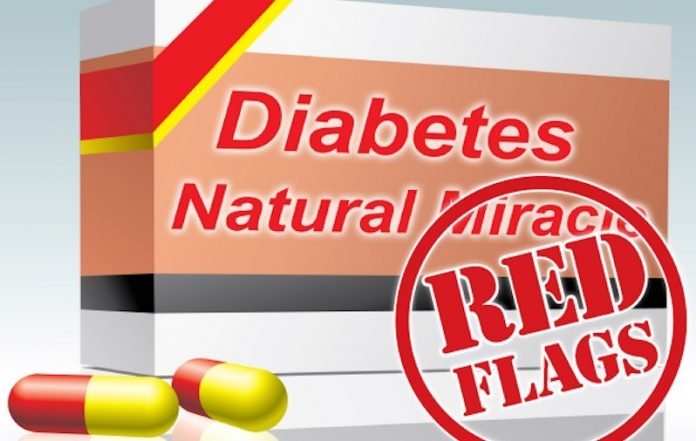
As the number of people diagnosed with diabetes continues to grow, illegally marketed products promising to prevent, treat, and even cure diabetes are flooding the marketplace.
The U.S. Food and Drug Administration (FDA) is advising consumers not to use such products—for many reasons.
For example, they may contain harmful ingredients or may improperly be marketed as over-the-counter (OTC) products when they should be marketed as prescription products.
Illegally marketed products carry an additional risk if they cause people to delay or discontinue effective treatments for diabetes.
Without proper disease management, people with diabetes are at a greater risk for developing serious health complications.
More than 30 million people in the United States have diabetes, and one out of four don’t know they have it, according to the Centers for Disease Control and Prevention.
Millions more have pre-diabetes, meaning they have higher than normal blood sugar levels and can reduce their risks of developing diabetes through healthy lifestyle changes, including diet and exercise.
“People with chronic or incurable diseases may feel desperate and become easy targets.
Bogus products for diabetes are particularly troubling because there are effective options available to help manage this serious disease rather than exposing patients to unproven and unreasonably risky products,” said Jason Humbert, a captain with the U.S. Public Health Service who is with FDA’s Office of Regulatory Affairs.
“Failure to follow well-established treatment plans can lead to, among other things, amputations, kidney disease, blindness, and death.”
To protect the public health, FDA surveys the marketplace for illegally marketed products promising to treat diabetes and its complications, and investigates consumer complaints.
Unapproved Diabetes Drugs
FDA has issued warning letters to various companies that market products for diabetes in violation of federal law.
These products were marketed as dietary supplements; alternative medicines, such as ayurvedics; prescription drugs; over-the-counter drugs; and homeopathic products.
Some of the companies also promoted the same unapproved drugs for other serious diseases, including cancer, sexually transmitted diseases, and macular degeneration.
FDA laboratory analysis has found “all-natural” products for diabetes to contain undeclared active ingredients found in approved prescription drugs intended for treatment of diabetes.
Undeclared active ingredients can cause serious harm.
If consumers and their health care professionals are unaware of the actual active ingredients in the products they are taking, these products may interact in dangerous ways with other medications.
One possible complication: Patients may end up taking a larger combined dose of the diabetic drugs than they intended. This may cause a significant and unsafe drop in blood sugar levels, a condition known as hypoglycemia.
FDA also looks at illegal marketing of prescription drugs by fraudulent online pharmacies.
Signs that may indicate an online pharmacy is legitimate include: requiring that patients have a valid prescription, providing a physical address in the United States, being licensed by a state pharmacy board, and providing a state-licensed pharmacist to answer questions.
Some fraudulent online pharmacies illegally market drugs that are not approved in the United States, or sell otherwise approved prescription drug products without meeting necessary requirements.
Although some of these websites may offer for sale what appear to be FDA-approved prescription drugs, FDA cannot be certain that the manufacture or the handling of these drugs follows U.S. regulations or that the drugs are safe and effective for their intended uses.
Also, there is a risk the drugs may be counterfeit, contaminated, expired, or otherwise unsafe.
A Far-Reaching Problem
“Products that promise an easy fix might be alluring, but consumers are gambling with their health. In general, diabetes is a chronic disease, but it is manageable.
And people can lower their risk for developing complications by following treatments prescribed by health care professionals, carefully monitoring blood sugar levels, and sticking to an appropriate diet and exercise program,” Humbert said.
If you care about diabetes, please read studies about food that can cut your diabetes risks, and Zinc may be key to better diabetes treatments.
For more information about diabetes, please see recent studies about diabetes drug that could treat lung inflammation in COVID-19, and results showing why do people with diabetes develop severe COVID-19.



